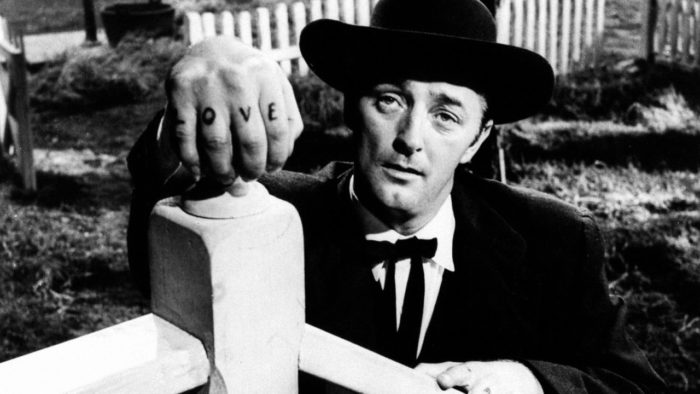
Thinking back to the original Criterion month we did back in July, there was one recurring theme that seemed to emerge when sifting through all these classic films that the good folks at Criterion Collection have taken it upon themselves to preserve. And that’s that no matter how old a film is, if it actually is a worthwhile piece of art, whatever it has to say will be timeless. Take for instance, The Night of The Hunter, a film that I originally saw my first year of college, and watching it this week, I was able to watch through the lense of the moment in time we’re living through right now.
Mainly, The Night Of The Hunter felt like an eerily appropriate movie for me to watch this particular week, in that it reinforces the idea that we shouldn’t trust seemingly upstanding white men as much as society has told us to. Robert Mitchum stars in perhaps his most iconic role as Harry Powell, a convicted serial killer who also professes to be a reverend. While in jail, he becomes bunkmates with an inmate, Ben Harper (played by Peter Graves) who after a bank robbery, manages to hide his fortune, which of course peaks the interest of the soon-to-be-released reverend. After being released, he heads to Harper’s hometown to court his wife and charm his two children, with the hopes of retrieving that fortune.
The timeless aspect I was getting at in regard to this film is the way Reverend Harry drapes himself in the righteousness and morals of Christianity, even though he is morally reprehensible and would clearly fit no one’s definition of a good Christian. Yet because he hides behind the cross, he’s able to fool the simpletons of this rural West Virginia town, and prey on their vulnerabilities with his unflappable charisma. And look, I’m not trying to infer that our current commander-in-chief is comparable to a psychopathic killer, but… well, actually I am. But I think that just speaks to this film’s understanding that America always has, and probably always will, have a fascination with bullshit artists.
I think the other thing that makes this film legitimately unnerving is the fact that our main protagonists are two children, even if the child actors playing them don’t give very remarkable performances. John and Pearl (played by Billy Chapin and Sally Jane Bruce, respectively) come under the guardianship of Reverand Harry, and unfortunately happen to be the only two who are suspicious of him. Granted, it takes them a while to catch onto his tricks, and the movie definitely plays around with the idea that as a kid you kind of just assume all adults are trustworthy, and especially if they command an air of respect.
In his review of The Uninvited, Sean made it seem like that film couldn’t transcend itself being a product of the Hollywood studio system to be something truly scary. Meanwhile, The Night of The Hunter seems to be the rare example of a studio film transcending its inherent sheen to become something a bit stranger. Part of this probably has to do with the fact that the film was a bit of an anomaly as far as the talent behind the scenes. Hunter was the only film ever directed by world-renowned thespian Charles Laughton, while it was one of the few films written by esteemed film critic and Pulitzer prize-winning author James Agee.
But in addition to being this unique melding of styles coming from two great minds working outside of their standard mediums, the film also benefits from the superb camera work of cinematographer Stanley Cortez. He and Laughton supposedly took inspiration from silent film and German expressionism to craft the film’s harsh shadow-infused look. There are certain shots that paint the reverend as nothing but a silhouette across a dark horizon, thus giving him the stature of both flesh and blood, but also as a kind of Southern gothic boogeyman.
This stark use of silent film-inspired visuals also makes it all the more appropriate that the film casts silent film star Lillian Gish as the ornery old woman willing to stand up to the bullshit artist’s bullshit. Of course (spoiler), you can tell that this is a Hollywood film, since the charismatic bullshit artist ends up in jail and everything is tied up cleanly. Would that it were so simple…


